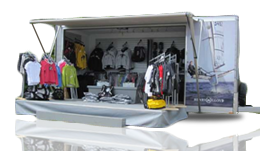Semi-Truck Summer Tires: Do I Need Them?

You may not realize it, but the weather can, in fact, affect road conditions and therefore affect anything from vehicle handling to fuel efficiency. This holds true for any vehicle, even trucks. That’s why there are tires made specifically for certain seasons, like winter tires and summer tires.
Unlike some parts or attachments such as headache racks whose purposes aren’t immediately obvious, seasonal tires are pretty straightforward: you use them during the season they’re designed for. Compared to winter tires, however, it isn’t immediately obvious how well summer tires perform during the summer months. Likewise, their benefits aren’t noticeable, unless you know what to look for. After all, how much different are summer tires compared to any other when they’re all designed to function in warm weather and on either dry or wet roads? Here’s what you need to know.
What’s Inside
The Difference Between Tires
Most tires deliver when it comes to baseline performance, functioning well in most – if not all – weather conditions. Modern technology is to thank for that since it has led to improvements that allowed vehicle manufacturers to produce tires that work all year round. However, when tire performance is as diverse as that, one can expect certain compromises.
In the case of all-season tires, they’re like triathletes; the latter are certainly capable in bicycling, swimming, and running, just as the former can and will run in all temperatures and whether the roads are slick with snow and rain or not. However, a triathlete will lose against, say, a dedicated runner or swimmer. All-season tires, therefore, won’t perform as well in certain conditions compared to tires that are designed to withstand those conditions.
To be more specific, winter tires are designed to still provide great traction in temperatures below 45°F, even when roads are icy or slippery because of melting snow. In a similar way, summer tires make it easier for trucks to brake, accelerate, and turn corners even on extremely hot and dry – or else hot but wet – roads.
Using winter tires in hot weather may well affect the vehicle’s ability to run at high speeds. Meanwhile, all-season tires will perform better in comparison, but there’s a chance they could inflate too much or even explode if the temperature climbs too high. Summer tires, however, will encounter none of those problems, and no risk of tire blowouts means there’s no risk of road accidents.
How Summer Tires Work
These seasonal tires are manufactured using compounds that provide excellent pliability and traction in warm weather, but effectively harden or freeze if used in cold weather. This results in tires with treads that can’t adapt to and grip the road properly, compromising the truck’s speed and braking or stopping time. This, in turn, would make the truck unsafe to drive in, not to mention have a negative effect on the same vehicle’s fuel efficiency.
As you can tell, the best time to use summer tires is whenever temperatures are at least 45°F. Anything lower than that and you could find yourself driving a truck that’s difficult to control, doesn’t speed up or stop easily, and will have you refilling the gas tank more often than you may be used to.
When to Use Summer Tires
If you live and work in states where the weather is usually warm, even later in the year, there’s no reason you can’t use summer tires all year round – unless temperatures drop enough to warrant switching them out for winter tires. As mentioned above, driving with summer tires when in cold weather, especially when there’s snow or sleet, is a surefire way to endanger yourself because of a lack of traction, among other effects.
It’s not just about what winter conditions can do to those seasonal tires, either. If you insist on using them and therefore constantly subjecting them to a freeze-thaw cycle, the tires will reach the proverbial point of no return. The compounds in the rubber will stay frozen, impairing the tires’ performance and overall durability.
Storing Summer Tires
Once you’ve switched your summer tires out for all-season or winter tires, storing them properly is just a matter of keeping them inside a room or building that’s temperature-controlled so the compounds don’t freeze. You can also keep them in a garage, as long as they’re placed somewhere they won’t get hit directly by freezing winds. As to storing them outdoors, it’s best that you don’t even consider doing so.
The Takeaway
So do you need summer tires? Yes, they’re a good investment to make if you want to ensure your semi-truck operates optimally in all weather. You can make do with all-season tires for a while, of course, but if you notice that you drive more often in warm, summery weather, then the sooner you get a set of summer tires, the better for you and your truck.
That said, they’re not an absolute must-have; that is, you don’t have to empty your wallet just to make sure you have them. But you do need to seriously consider investing in them, since just as preventive maintenance for trucks can help you avoid expensive repairs, investing in seasonal tires will help ensure you drive as safely as possible, no matter what the weather is like.







